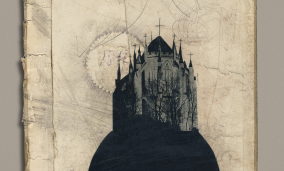Somewhere in the middle of the new novel,
Frankenstein the monster is reading a romance
entitled Frankenstein. To think
he came this far without it, it made his life
more romantic, more cloaked in fog, out
there, as childhood is before the child recalls.
It drew him breathless to the passage
he awakens to his father—or should I say,
his maker—who is too busy feeling horrible
to pity the face whose comely portions,
gleaned by lantern, shovel, long nausea,
and criminal risk, comprise the abject whole.
The yellow eyes tell us the creature’s liver
will not, cannot, purify his blood. It is,
after all, a stranger in the wilderness
of tendon and vein. Imagine the throb
of all that stitchery, how the seams moved
when he moved, how it felt to breathe.
And the creature (as our reader) thinks, clarity,
it takes so much out, the way it wrestles
one nature from another, one clear cloud
from clouds in the word cloud. He thinks,
clear, as death is, and the blade that cuts a child
into life, and the scar that seals the wound.
Then he looks up and stares into fields
of sky and the headstones of the saved.
Was it René Descartes who said, It’s simple.
If you cannot give me your heart, I’ll tear
it out. Or was that some other creature.
And just like that, the sky turns back to sky.
Just like that, each broken part is never broken
only, as kindness cannot, be, or a laugh
defaced by the laughter of the others.
I think therefore I read from a distance,
he says to his writer. My face the screen
on which the nightmare of a face begins.
In the laboratory chapter, transmogrified
here, lightning strikes the metal spire,
and the yellow eye that opens sees
a yellow world. Or it would if the story
looked, distracted as we are by clouds
of dust the Tesla coil razors with its light.
The long depressive curtain, the castle
stone limned in green, the thin insistent
incursions of rain that scarify the mortar,
what are they if not a promissory note,
the slung burden and authoritative bell
of dreams we take, in dreams, for dead.
The yellow eye wakes, and death’s antagonist—
let us call him scientist, father, creator, god—
draws back in shame and horror from his one
creation. He sees in him a miracle confusion,
drenched in the bile that is our birthright,
and says, in silence, hell. What did I expect.
Did I think the fevers of the world would burst
into flames. That the ache of the mother
or criminal or survivor kneeling to the casket
would crumple into wonder. That the romance
of a strange new science would sweep a body
in its arms and the phoenix of two clear eyes emerge.
Ask the child abandoned in a closet,
where does the darkness end, the hand begin.
The punished flesh gives to punishment
a flesh. A hand that, in darkness, opens
the vellum of the hand of the boy alone.
At the dark dawn of the new childhood,
a boy writes a page no one reads, least
of all a monster. But here we are, reading,
asking, whose body is this that is everywhere
and nowhere. Whose choler in the blood
and hair he sheds, the cavity he scars,
the broken amber of the radiant heart.

